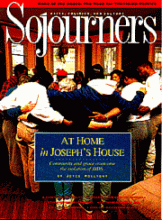With an ever tighter economy, socially conscious consumers are feeling a moral, as well as a financial, crunch: Do we buy cheaper at chain stores or do we pay more shopping locally? How do we do the right thing?
Most often these questions arise when people are purchasing gifts or shopping for groceries. But what about when buying books? The question may be more important than it seems.
Keeping Independent
Increasingly, consolidation is confusing the picture of the bookstore industry. For instance, B. Dalton, Waldenbooks, and Barnes & Noble, three stores often seen "competing" in North American malls, are actually all parts of the same corporation. It's a triune thing: three outlets, one business.
And, of course, large chain stores buy in mass quantities, and therefore can offer large discounts - sometimes as much as 40 percent - on bestsellers. Volume gives them leverage.
Thus small, independent stores can have difficulty competing with the megastores. They often cannot afford the rent of the large malls, so they must try to attract a faithful and committed local following. "If I had to compete with [the chain bookstores] on price alone, I would lose. But there are other ways to get people in your stores: local author readings, book-signings, specialty selections, good service," says David Unowsky, owner of the Hungry Mind, an independent bookstore in St. Paul.
Community service becomes the lifeline of the independent bookseller, just as it is for small downtown businesses. Unable to compete financially because of differences of scale, the indies need (and usually want) to provide a level of personal service that the bigger stores do not.
Read the Full Article

